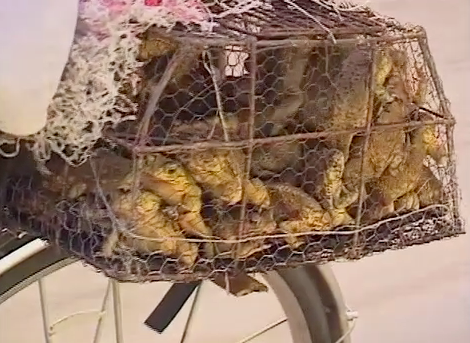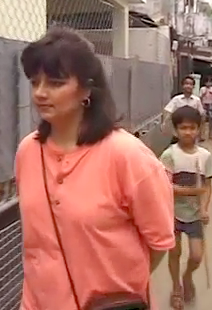Ch 7: Opener and Analysis
Unit Opener: Comments and Analysis
1. What are some aspects of life in Vietnam shown here that would strike most Americans as different or even strange?
There are a variety of aspects of everyday Vietnamese life shown: animals in the street, water buffalo being herded, dead poultry on the handlebars of a motor scooter, a basket of frogs on the back of a bike, hand-pulled hearses. How people are dressed is quite different (conical straw hats, traditional ao dai – tight-fitting silk tunic worn over pants -, school uniforms). The film shows other scenes of life such as shopping, preparing food, and visiting markets that are new to Heidi. Her relatives speak almost no English and she speaks no Vietnamese. It’s clearly a way of life worlds apart from what she is used to in her home town in Tennessee.
2. What kinds of feelings is Heidi having?
In this scene, after a few days in Vietnam, Heidi “feels like she’s on another planet”. When Heidi first arrived in Vietnam, her reaction was quite different. She was impressed with the affection among her family members. She said, “They may not have much here, but they do have love and unity. I’m kind of jealous of that.” The family is poor but they share all they have and they are visibly overjoyed to have Heidi there for a visit. Subsequently, however, Heidi ventures out beyond her immediate family and encounters what is for her a strange and bewildering way of life. She left Vietnam when she was six and is fully acclimated to life in America.
3. What does she want to do? Why?
 She wants to go back home: “I can not wait to get out of here”. She wants to “escape this world” and go back to the way of life that is “comfortable to me”. She is homesick and misses her family back in Tennessee. It is not only that everything around her is different, she is also feeling “suffocated” by the continual closeness and touching by all her relatives. Heidi is suffering from culture shock, the unsettling experience of feeling adrift in a foreign culture. The typical pattern of experiencing culture shock is like a U curve. You start on a high, as Heidi does, excited about being in a new and different environment. Then the profound differences in the way of life, the way in which all the routines of your everyday existence have been uprooted, your inability to communicate effectively, all lead to frustration, and, often, depression, sometimes even physical symptoms like headaches, upset stomach or insomnia – you’ve at the bottom of the U.
She wants to go back home: “I can not wait to get out of here”. She wants to “escape this world” and go back to the way of life that is “comfortable to me”. She is homesick and misses her family back in Tennessee. It is not only that everything around her is different, she is also feeling “suffocated” by the continual closeness and touching by all her relatives. Heidi is suffering from culture shock, the unsettling experience of feeling adrift in a foreign culture. The typical pattern of experiencing culture shock is like a U curve. You start on a high, as Heidi does, excited about being in a new and different environment. Then the profound differences in the way of life, the way in which all the routines of your everyday existence have been uprooted, your inability to communicate effectively, all lead to frustration, and, often, depression, sometimes even physical symptoms like headaches, upset stomach or insomnia – you’ve at the bottom of the U.
4. What does Heidi’s translator reveal about Heidi’s sense of the trip before coming to Vietnam?
The day before leaving for Vietnam, Heidi had told Tran Tuong Nhu, her translator, “Thank you for making my dreams come true.” Heidi had been dreaming about how wonderful her visit to Vietnam and reunion with her family would be. However, she had done little to prepare for the trip. Tran Tuong Nhu was the first Vietnamese person she had encountered since leaving Danang. She knew nothing about the country and had learned only a few words of Vietnamese. One of the ways to combat culture shock is to be prepared, as much as possible, for the culture you will encounter, learning about its history, its institutions, its way of life, its language, etc.
5. How do you suppose Heidi did for the rest of her trip to Vietnam?
Tran Tuong Nhu tells Heidi that if she will stay longer, things will get better. In fact, this is the normal pattern for culture shock. If one is willing to keep at it, things do get better – you get used to the different ways of doing things, you meet people and make friends, you start to be able to do more with the language, you find other coping mechanisms. In short, you adapt to the new culture; that’s the slant back up of the U curve. This, however, is not a universal or inevitable experience. In Heidi’s case, she doesn’t make it to this stage. She is too unprepared for the culture and too set in her ways to be able to adjust. Added to that, she is also upset that her Vietnamese family expects her to send back monthly checks to help out the family. She leaves Vietnam early.
What’s the point of this unit’s opener?
Adjusting to life in a different culture can be a difficult process. For those who go to a new culture for an extended period of time there is typically a period of acculturation – adjusting in one way or another to living in the new environment. Sometimes that results in new arrivals giving up their old way of life and assimilating completely into the new culture. In other cases the new arrivals live in a ghetto-like environment in which they continue more or less the same life they had before. Ideally, one integrates into the new culture, learning to function comfortably in the new language and customs, yet still maintains one’s cultural heritage. To be able to acculturate successfully, one needs 1) some knowledge of the other culture, 2) the motivation to learn and adapt, and 3) the skills (verbal, non-verbal, social-psychological) necessary to function in the culture. Heidi has to some extent the motivation, but not much in the other areas.

